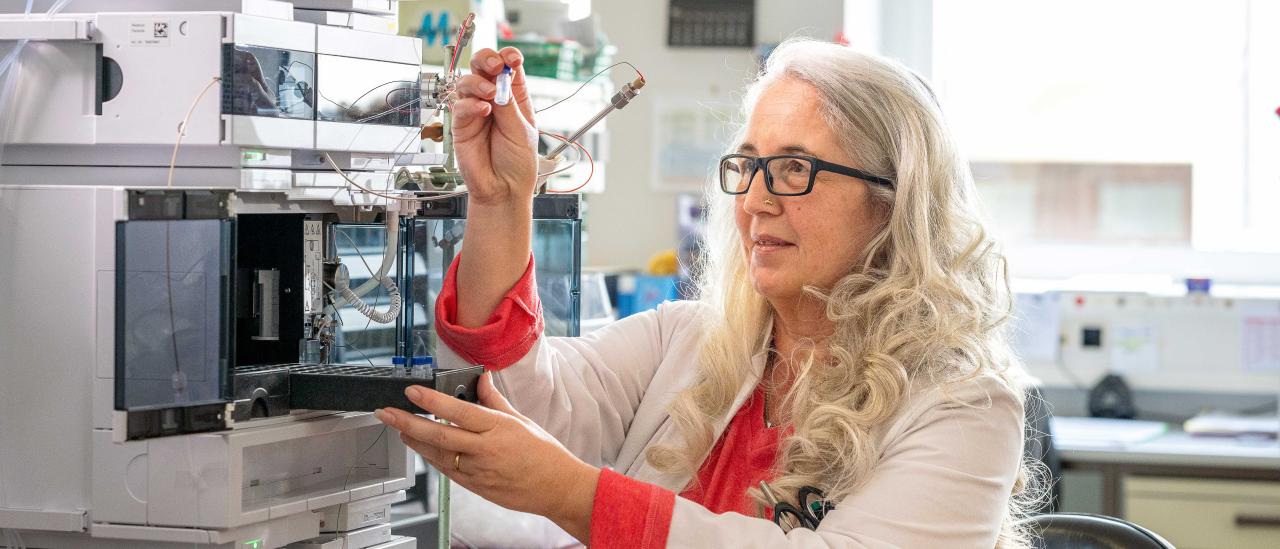
Individualization of drug therapy through therapeutic drug monitoring and pharmacogenetics
- Psychotropic drug therapy
- Immunosuppressive therapy
- Antibiotics
Modern analytical techniques: Immunoassays and LCMS, molecular biological methods
Quality management and development of guidelines
The following specific issues are currently being addressed:
Polymorphisms of metabolizing enzymes and genetic variants of drug targets.
- The influence of polymorphisms of cytochromes P450 2D6 and 2C19 on the pharmacokinetics and clinical effects and side effects of therapy with antidepressants and antipsychotics.
- CYP1A2 and therapy with atypical antipsychotics.
- Polymorphisms of dopamine receptors (DRD2, DRD4), HT receptors (HT2A, HT2C), the HT transporter (HTTLPR, HTT VNTR), P-glycoprotein (P-gp) on clinical effects and side effects of psychotropic drug therapy (MC4R).
Possibilities for individualizing drug therapy through pre-therapeutic gene screening.
Evaluation of new methods for monitoring drug therapy with psychotropic drugs (antidepressants, neuroleptics), antibiotics and immunosuppressants (CsA, tacrolimus, mycophenolate, sirolimus, etc.).


Prof. Steimer graduated summa cum laude from Ludwig-Maximilian-University Munich, Germany, where he also completed his residency in Laboratory Medicine (clinical pathology) at Grosshadern University Medical Center in Munich. In 1992 he became the head of Therapeutic Drug Monitoring at the Institute for Clinical Chemistry and Pathophysiology at the TU-München, before being appointed Assistant Medical Director in 2000 and Associate Professor in 2011. Prof. Steimer’s research interests cover pharmacogenetics of drug metabolizing enzymes and drug targets, particularly in psychoactive therapy, as well as therapeutic drug monitoring, analytical techniques (immunoassays and LCMS), quality and standards of practice, immunosuppressive drugs and digoxin. He has published over 150 papers, abstracts and book articles, mainly on Pharmacogenetics and TDM, and is peer reviewer for 12 international journals, the NACB and two research funding organizations. He also serves on the editorial board of the “Journal of Laboratory Medicine”, the Journal of the German Association for Laboratory Medicine since 2001. He has been an invited speaker on more than 100 mostly international occasions and has won 12 international awards at AACC and IATDMCT meetings since 2002. He is also scientific advisor for a national and international proficiency testing scheme in Germany. Prof. Steimer has been a member of DGKL, IATDMCT, the AACC (ADLM) and their TDM/Clinical Toxicology, Molecular Pathology and Personalized Medicine division and NACB as well as some other international organizations and subcommittees (AGNP, IFCC etc.).
Genetic association of the rs17782313 polymorphism with antipsychotic-induced weight gain. Schreyer, K.F., Leucht, S., Heres, S., Steimer, W. (2023). Psychopharmacology (Berl)240, 899-908. doi 10.1007/s00213-023-06331-9
Therapeutic Drug Monitoring of Rivastigmine and Donepezil Under Consideration of CYP2D6 Genotype-Dependent Metabolism of Donepezil.
Ortner, M., Stange, M., Schneider, H., Schroder, C., Buerger, K., Muller, C., Muller-Sarnowski, F., Diehl-Schmid, J., Forstl, H., Grimmer, T., Steimer, W. (2020). Drug Des Devel Ther14, 3251-3262. doi 10.2147/DDDT.S247259
Consensus Guidelines for Therapeutic Drug Monitoring in Neuropsychopharmacology: Update 2017.
Hiemke, C., Bergemann, N., Clement, H.W., Conca, A., Deckert, J., Domschke, K., Eckermann, G., Egberts, K., Gerlach, M., Greiner, C., Grunder, G., Haen, E., Havemann-Reinecke, U., Hefner, G., Helmer, R., Janssen, G., Jaquenoud, E., Laux, G., Messer, T., Mossner, R., Muller, M.J., Paulzen, M., Pfuhlmann, B., Riederer, P., Saria, A., Schoppek, B., Schoretsanitis, G., Schwarz, M., Gracia, M.S., Stegmann, B., Steimer, W., Stingl, J.C., Uhr, M., Ulrich, S., Unterecker, S., Waschgler, R., Zernig, G., Zurek, G., Baumann, P. (2018). Pharmacopsychiatry 51, 9-62. doi 10.1055/s-0043-116492
CYP1A2*1D and *1F polymorphisms have a significant impact on olanzapine serum concentrations. Czerwensky, F., Leucht, S., Steimer, W. (2015). Ther Drug Monit 37, 152-60. doi 10.1097/FTD.0000000000000119
MC4R rs489693: a clinical risk factor for second generation antipsychotic-related weight gain?
Czerwensky, F., Leucht, S., Steimer, W. (2013). Int J Neuropsychopharmacol 16, 2103-9. doi 10.1017/S1461145713000849
DRD4 48 bp VNTR but not 5-HT 2C Cys23Ser receptor polymorphism is related to antipsychotic-induced weight gain.
Popp, J., Leucht, S., Heres, S., Steimer, W. (2009). Pharmacogenomics J 9, 71-7. doi 10.1038/tpj.2008.5
Amitriptyline or not, that is the question: pharmacogenetic testing of CYP2D6 and CYP2C19 identifies patients with low or high risk for side effects in amitriptyline therapy.
Steimer, W., Zopf, K., von Amelunxen, S., Pfeiffer, H., Bachofer, J., Popp, J., Messner, B., Kissling, W., Leucht, S. (2005). Clin Chem 51, 376-85. doi 10.1373/clinchem.2004.041327
Allele-specific change of concentration and functional gene dose for the prediction of steady-state serum concentrations of amitriptyline and nortriptyline in CYP2C19 and CYP2D6 extensive and intermediate metabolizers.
Steimer, W., Zopf, K., von Amelunxen, S., Pfeiffer, H., Bachofer, J., Popp, J., Messner, B., Kissling, W., Leucht, S. (2004). Clin Chem 50, 1623-33. doi 10.1373/clinchem.2003.030825
Digoxin assays: frequent, substantial, and potentially dangerous interference by spironolactone, canrenone, and other steroids.
Steimer, W., Muller, C., Eber, B. (2002). Clin Chem 48, 507-16. doi 10.1093/clinchem/48.3.507
Intoxication due to negative canrenone interference in digoxin drug monitoring.
Steimer, W., Muller, C., Eber, B., Emmanuilidis, K. (1999). Lancet 354, 1176-7. doi 10.1016/S0140-6736(99)03818-0
Performance and specificity of monoclonal immunoassays for cyclosporine monitoring: how specific is specific?
Steimer, W. (1999). Clin Chem 45, 371-81. doi 10.1093/clinchem/45.3.371